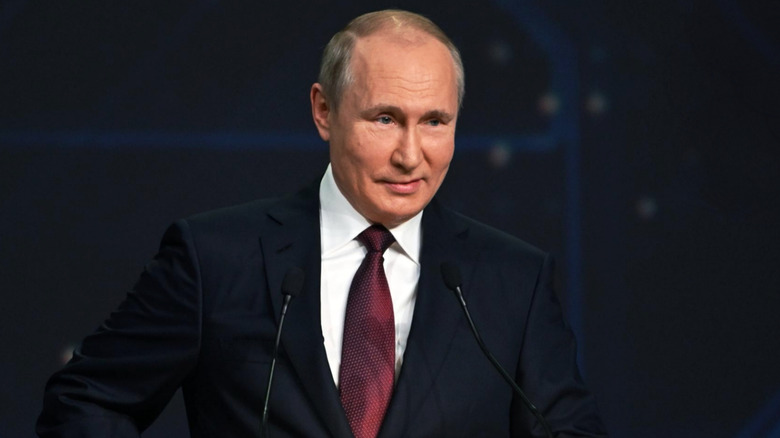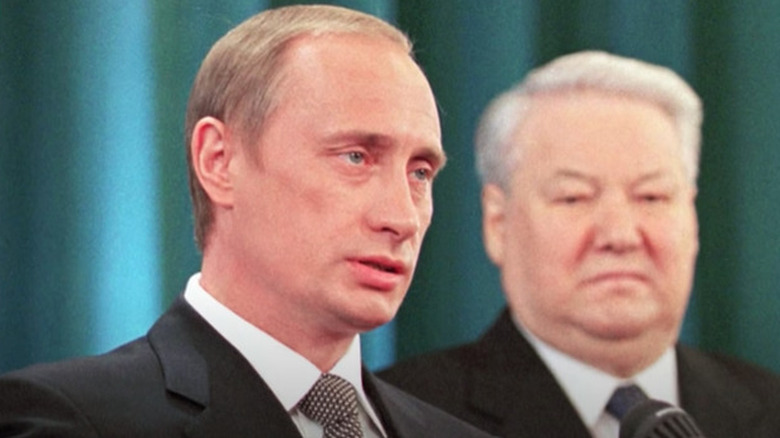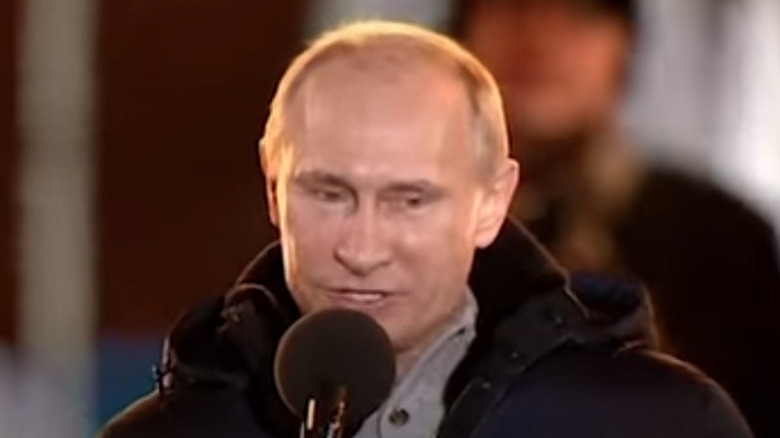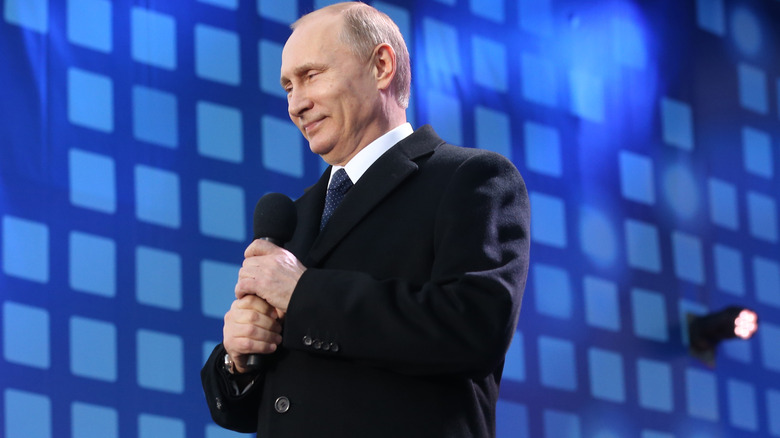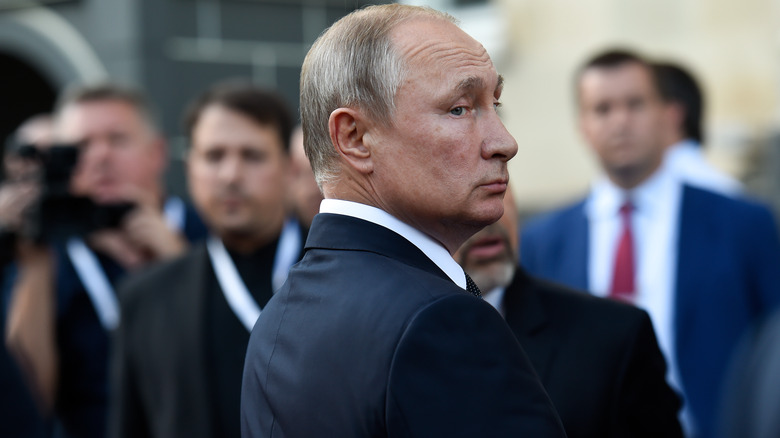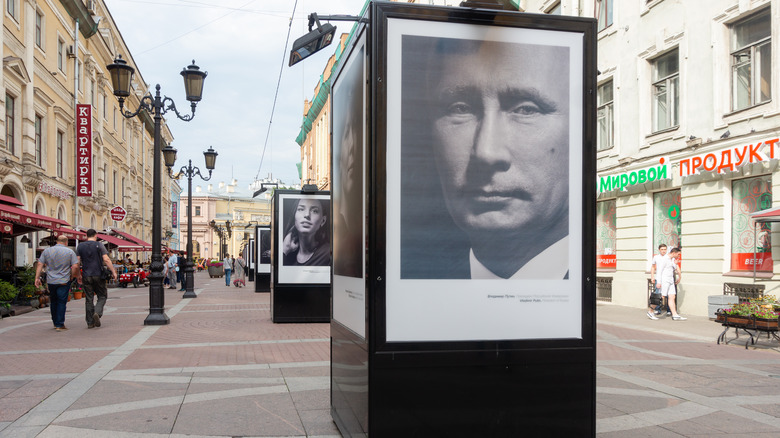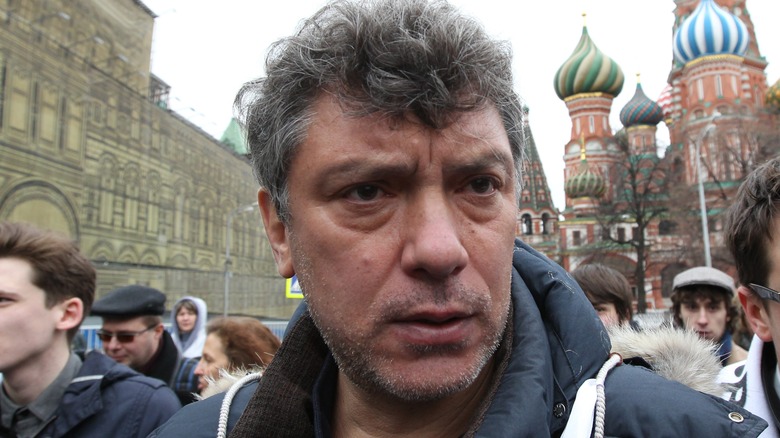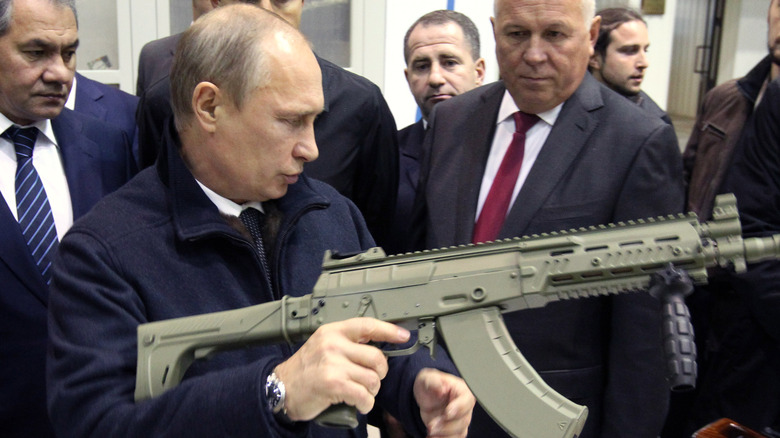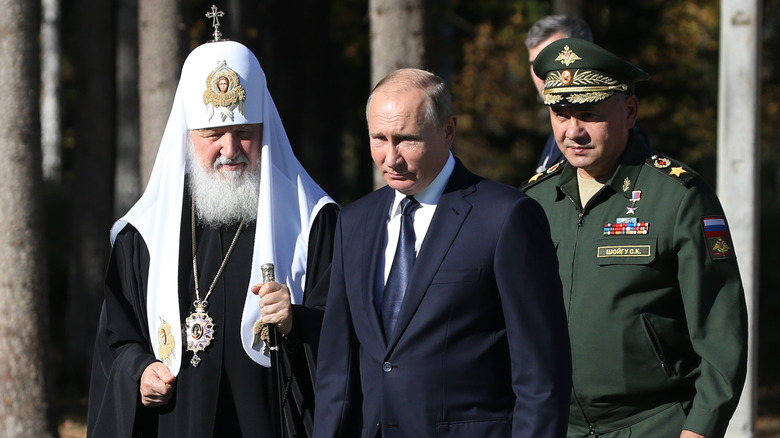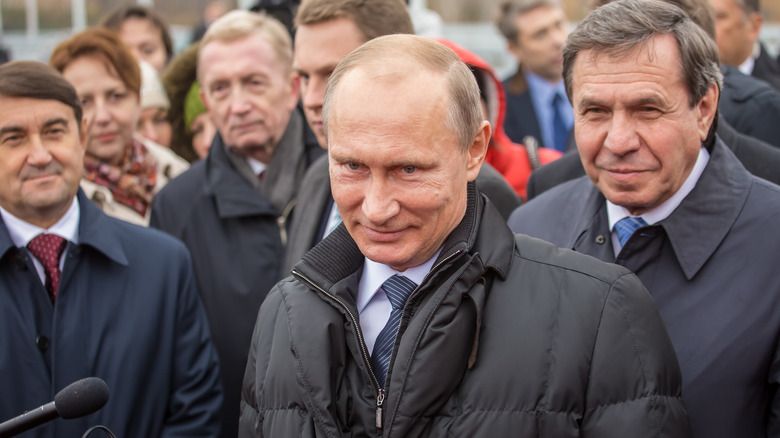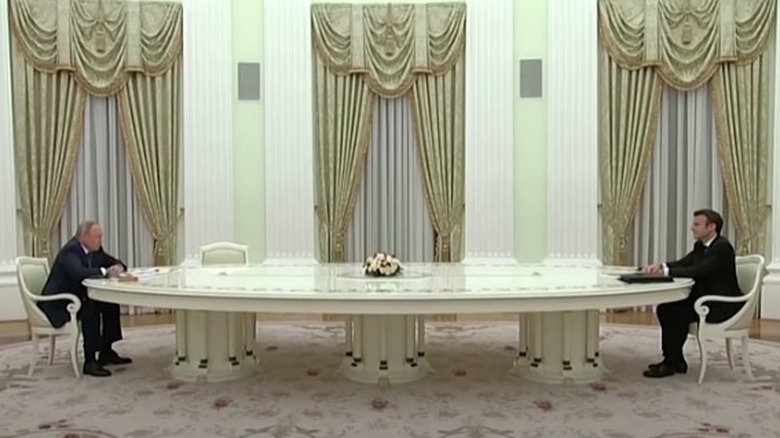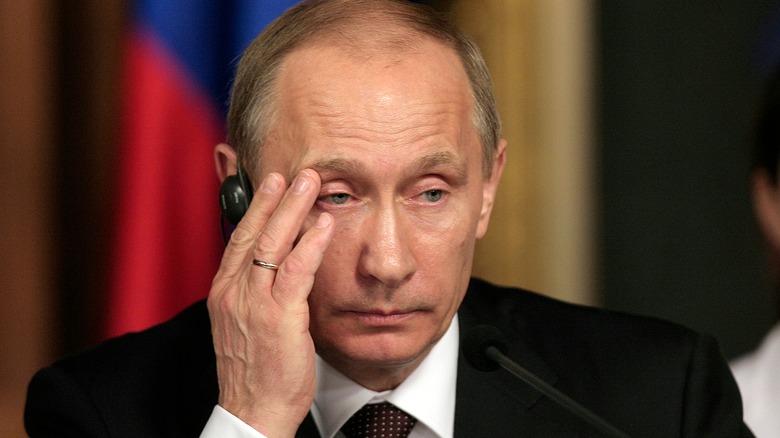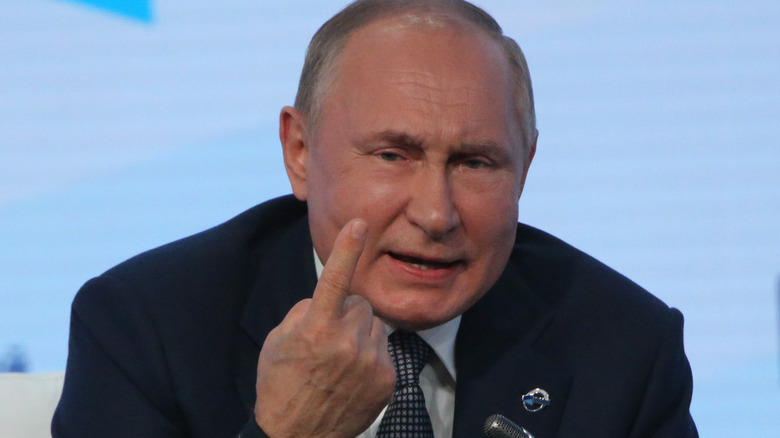The Frightening Transformation Of Vladimir Putin
Vladimir Putin was once just a kid who loved spy novels and TV shows. He became fascinated with the Soviet version of James Bond, Max Otto von Stierlitz, in the popular Soviet TV series "Seventeen Moments of Spring," per Richard Sakwa's "Putin: Russia's Choice." In a 1991 documentary commissioned by Putin about himself, he reenacted a scene from the TV show where he drove a car to the TV series' theme song, per PBS and the CIA. Putin used the documentary to introduce himself within the world of politics and relay his political wisdom, including a prognostication that Russia would fall into totalitarianism. He warned Russian viewers to avoid being seduced by the law and order such a government would bring, admitting that life might seem better under totalitarianism, "but in reality, we won't be comfortable for long: the iron fist will soon strangle us all," he claimed (via the BBC).
It took him 17 years in the KGB and even less time in politics to eventually become the most powerful man in Russia and eventually embody his warning. He's been in power for nearly 19 years and has gripped Russia with an iron fist; he's cracked down on human rights, limiting free expression and freedom of the press, and abetting discrimination against LGBTQ members, per Quartz. With his recent brutal military campaign against Ukraine, one has to wonder how Putin came to ignore his advice from long ago and transform into the Putin of today.
Putin's rise to political power
When Vladimir Putin was just in high school, he was set on becoming a spy. As a student, he visited the KGB offices and inquired on what he needed to do to join. This set his career in motion, leading Putin to attend law school at Leningrad State University and then achieve his dreams as a foreign intelligence agent for the KGB, per Business Insider. In 1991, he resigned from the KGB after an attempted coup against Mikhail Gorbachev's government. Putin, who was known for his patriotism and loyalty to the government, said he didn't agree with the actions of the government during that incident, per The Times.
He then began a career in politics working for then Leningrad's — now St. Petersburg's — mayor Anatoly Sobchak. It was from Sobchak that Putin learned authoritarian behavior, according to Ben Judah's book "Fragile Empire" (via Business Insider). In 1998, Boris Yeltsin, the president of Russia at the time, appointed Putin director of the FSB, and a year later, Yeltsin made Putin the prime minister of Russia. As Yeltsin's time in office disintegrated after an unpopular war in Chechnya, he resigned from office and Putin became the acting president. Shortly after, Putin won his own first election as president, according to Business Insider.
He may have stolen his election
Vladimir Putin has won four presidential elections, but they've been fraught with controversy. In 2012 — his third election race — Putin's win was mired by allegations of electoral fraud, according to The Guardian. Observers working for opposing candidates were reportedly physically beaten at polling stations and prevented from entering. Opponent Alexey Navalny declared Putin's win as illegitimate, sharing the sentiment with other candidates.
The Kremlin prepared for unrest due to the allegations by setting up Interior ministry troops in front of its building, but many Russians have grown immune to the Kremlin's antics, and citizens vote despite knowing that election results are predetermined. In Russia, voting for the sake of voting is a cultural institution, regardless if citizens feel their civic duty makes an impact. Since Soviet times, Russians frequently voted in elections that were not competitive and whose results were expected, per The Guardian.
Allegations of fraud continued during Putin's fourth presidential election in 2018, per The Moscow Times. During the 2021 Parliamentary elections, the Kremlin barred neutral observers from the Organization for Security and Cooperation in Europe (OSCE) from entering polling stations, leading to the widespread belief that Putin's party gains were not fairly earned. Viral videos depicted ballot stuffing, and where electronic ballots were concerned, opposing parties suddenly lost leads when the results were finally announced, per the BBC.
He's given himself more power
At the start of Vladimir Putin's second term in 2004, he dismantled the democratic elections of Russia's regional governors, according to Reuters. After nationwide protests in 2012, Putin's successor Dmitri Medvedev reintroduced them. Putin was reelected again that year, and once the protests died down, he undid those reforms, per The New York Times. His new law allowed regional legislatures to vote against popular elections and instead choose from three candidates hand-picked by Putin. He argued it was done to protect minority preferences, but it came at a time when Putin's party was increasingly unpopular and had just lost several seats in the 2011 Parliamentary elections, per Reuters.
Putin's third term itself was considered a breach of political norms. Although the Russian Constitution at the time only prohibited more than two consecutive terms, his third term in 2012 was deemed in violation of the "spirit" of the law, per Brookings Institute. Putin changed that law, too. In April 2021, he made constitutional changes that would allow him to remain in power until 2036, per CBS News. Expanding the parameters of his power allows Putin to shape Russia however he wants. Within the backdrop of Russia's invasion of Ukraine, Putin has now made it illegal to spread "disinformation" online about the war — or at least opinions that do not jive with the Kremlin's narrative. A violation can incur up to a 15-year sentence in prison, per USA Today.
He's created a mafia state
Vladimir Putin has allowed corruption to flourish under his watch and has often wielded it as a weapon. In fact, he won the Organized Crime and Corruption Project's Person of the Year in 2014. The organization alleges that Putin has formed a "military-industrial-political-criminal complex" in order to benefit himself and Russia. Putin has also used his former KGB contacts in a covert global system of crime, exploiting the lack of oversight of offshore companies for money laundering schemes. Russian expert Mark Geolotti says that although organized crime doesn't control the Kremlin, it has thrived under Putin's rule (via The Guardian). Many gangsters have evaded law enforcement and found refuge in Russia's corrupt system as long as they don't threaten Putin's status quo. Putin has made hollow public promises to do away with corruption, but even in cases where he's made arrests, he's released them quietly in exchange for their loyalty, per OCCRP.
Putin's inner circle, the siloviki, have acted as his own mafia, often threatening and using violence to safeguard their interests. Many members of the siloviki are former KGB agents and have been accused of assassinating enemies of the state. Nikolai Patrushev, the current head of Russia's security council and Putin's informal national security advisor, worked at the KGB with Putin. The British inquiry into Alexander Litvinenko's assassination found that Patrushev "approved" of the operation, per The Guardian.
He's fine-tuned the propaganda machine
In Vladimir Putin's mind, he owns Russian media, and he's not afraid to say it aloud. In 2013, he told reporters that Russian media should be patriotic and serve the interests of the state, per The Atlantic. When he first came into office, Putin prioritized seizing control over domestic media. According to the Central Asia Caucasus Institute, Putin saw Boris Yeltsin's failure in the first Chechen war as due to its unpopularity at home and its lack of support in Russian media. In contrast, Putin has used state-controlled media in order to frame the 2014 annexation of Crimea as justified and claim that Georgia was responsible for the 2008 war, when in fact, Russia had invaded, according to Foreign Policy.
More recently, pro-Kremlin propaganda has been engineered to garner at-home support for the Russian invasion of Ukraine — or the "special military operation" as his regime prefers to call it, per NBC News. As images of the Bucha massacre circulated the internet, state-affiliated news claimed the murders of innocent civilians were done by Ukraine's military, not Russia's. Some Russian news outlets said that the images were fake and claimed that the corpses seen in them were moving. In schools, children have been conditioned to support the war and partake in a celebration called "Crimean Spring" which commemorates Russia's annexation of Crimea, according to The Washington Post.
He reportedly murders his enemies
Various Kremlin dissidents and critics of Vladimir Putin have died under strange circumstances, leading analysts to conclude that Putin is behind them. One of the most prominent victims is former deputy prime minister Boris Nemtsov, who served during Boris Yeltsin's presidency. Once considered Putin's competition as Yeltsin's successor, he was outspoken in his criticism of Putin's attack on Ukraine in 2014. He was shot four times in the back as he was walking home. Putin claimed to oversee the investigation himself, and unsurprisingly, key questions about the killing were never answered, per Business Insider and the BBC.
In a particularly high-profile case, former KGB agent Alexander Litvinenko was poisoned at a London hotel after drinking a cup of tea laced with polonium-210. He had been working for the British secret service M16 and had written a book exposing the Kremlin to domestic terrorism and for being behind journalist Anna Politskavaya's death, per the BBC. A British inquiry into his death found that Putin had "probably" approved of his murder, per the BBC.
He's developed a personality cult
In August 2011, Vladimir Putin made a significant archaeological discovery: he found two sixth century B.C. Greek urns on the floor of the Black Sea while scuba diving. Except, that's not true. Two months later, a Kremlin spokesperson admitted that the photo-op had been staged and the urns were discovered by others. The incident came a year before his 2012 re-election and was part of a concerted effort to frame Putin as a "tough man of action," per The Guardian.
Likewise, he's been photographed on a motorcycle during a biker festival, posing shirtless while fishing and riding horses, piloting a jet, and crouching next to a tiger, per The Guardian. He has had similar modeling sessions in 2017 — where he famously posed bare-chested in various photos — and in 2021, according to The New York Times. Putin is often photographed outdoors, projecting a rugged manliness, good physical health, and an appreciation of Russian nature and wildlife, all of which is meant to indicate his ability to govern for the long haul. Although not quite like Stalin's, all this has contributed to a personality cult centered on the Russian leader. In fact, a 2011 poll found that 25% of Russians believed that Putin had his own personality cult, per Radio Free Europe. It's not hard to believe considering that prior to his 2004 reelection, a song called "I Want a Man Like Putin" was a hit in Russia, per The Wall Street Journal.
He's made an important ally — the Church
In 2018, Vladimir Putin stripped down into a bathing suit and recreated his baptism by plunging into Lake Seliger, all as cameras recorded everything. It was done in honor of the feast of Epiphany. Hundreds of thousands of Russians partake in the practice which is meant to honor Jesus' own baptism in the Jordan River, according to Newsweek. Per a Pew Research poll from 2017, 71% of Russians identify as Orthodox Christian, and Putin has sought to maneuver the Church's influence in his favor. He has positioned himself as a defender of "traditional" values and Christian morality, once encouraging Russians to have families with three children, per Reuters.
Putin has weaponized the Orthodox Christian Church in pursuit of Ukraine, by invoking both Ukraine and Russia's shared Orthodox Christian heritage to incur solidarity. He's framed Russia (and himself) as a bastion of Christian virtues and has attempted to cast Western Europe's secularity — along with its fight for LGBTQ and women's rights — as incompatible, per The United States Institute of Peace. As Putin has aligned himself with the Church, Orthodox Christians have become a core foundation of his support. However, that alliance has eroded in recent years as Christian activists have engaged in pro-democracy rallies and have taken issue with Putin's demonization of Ukrainians, as Ukraine sought to ally itself with the West, per Politico.
He's reverted to KGB tactics
Old habits die hard for Vladimir Putin. In a reported effort to get American presidential candidate Donald Trump elected into office, he reached into his dusty KGB playbook to make it happen. The Kremlin's effort to influence American opinion on social media reflected a Soviet effort in the 1980s to prevent the U.S. from placing its nuclear missiles in Western Europe, according to The Wall Street Journal. The USSR courted peace activists and paid them to form an opposition against American weapons, which runs parallel to the Kremlin's hiring of social media users and trolls to disseminate disinformation. The USSR forged U.S. and NATO documents and released "fake news" into the press in order to sway public opinion and muster anti-American sentiment throughout several continents.
Putin has maintained ties with former KGB agents and they're often part of his inner circle. Putin has used his office to enrich those friends and former colleagues by exploiting Russia's oil and gas industries, according to Catherine Belton's "Putin's People" (via Foreign Policy). According to Russia expert Marvin Kalb, Putin has surrounded himself with the same circle — most of whom are KGB connections — for the past 22 years, which has effectively preserved his Soviet-era philosophy of the world (via Vox). It's a philosophy in which Slavic states like Ukraine inherently belong to Russia.
He's grown isolated
Recent photos of Vladimir Putin meeting with his advisors and foreign dignitaries have raised a few eyebrows. In most photos, Putin is seated distantly from his guests, sometimes at opposite ends of a table or across a gaping rotunda at the Kremlin, according to The Washington Post. The reason given is his wariness about COVID-19; in fact, his former personal secretary was forced to quarantine two to three weeks a month in order to catch a word with him. But political analysts suspect something more is at play. According to Russian Journalist Mikchail Zygar, Putin has surrounded himself by yes men and cut off contact to anyone else. His behavior has been described as paranoid — distrusting of the advice of even people who seek to please him. During the pandemic, he quarantined with his close friend and advisor Yuri Kovalchuk and became obsessed about reestablishing Russian imperialism during his isolation. In the process, Putin has reportedly become disinterested in current political and economic affairs (via The New York Times).
In an alternate explanation, Putin's strange behavior is intentionally meant to confound. Russia expert Sam Greene says part of Putin's enigmatic behavior on screen is deliberately created in order to keep his adversaries guessing and ignorant to Putin's intentions (via CNN). But Putin unwittingly endangered his plans. According to Foreign Affairs, his secrecy may have detrimental to his war efforts, since he resisted informing even his advisors of military plans.
He's begun to gamble
Vladimir Putin may not be as rational as he was before. Former U.S. president Barack Obama can attest to this, as he did during an appearance at The University of Chicago (via CNN). Obama has said that Putin has changed since he knew him last. The current — and arguably more dangerous — Putin is willing to "bet the farm" to get ahead. Although Obama concedes that Putin's merciless ambitions have remained the same, Putin's cost-benefit analysis of risking an all-out war has changed.
There's a sense among analysts that Putin has passed a point of no return in his war against Ukraine. Now that Russia's invasion has stumbled in its early days and taken longer than expected, Putin is likely to be desperate and willing to intensify his attack to get back what he invested, according to Foreign Affairs. Putin's baseless logic for attacking Ukraine by accusing it of Nazism has made political analysts question his "ability to think rationally," per CNBC. His focus on reestablishing Ukraine under a Russian hegemony has been labelled an obsession, a descriptor fit for a madman.
He's made some 'big lies'
With his ruthless war against Ukraine, Vladimir Putin has drawn some unsavory comparisons to a certain 20th-century despot. And with President Joe Biden's accusing Putin of genocide in Ukraine (via The Hill), the world's juxtaposing of Putin with Adolf Hitler becomes more convenient. The comparisons began when Putin made a "Big Lie" — a manipulative tactic used in Nazi propaganda to make a lie so outrageous that it exploits the good faith of those hearing it, leading them to have no choice but to believe the lie, according to The Boston Globe. Putin's Big Lie is that his military invasion of Ukraine was done to "denazify" the country and save Ukraine from "genocide," per NPR. This is despite the fact that Ukraine's president is Jewish, and Russia has now committed more atrocities against Ukrainians than what Ukrainians faced before the invasion.
Putin has gone all in with his lie, going so far as to accuse Western countries of ignoring Ukraine's supposed widespread neo-Nazism. In fact, Putin has been accusing Ukraine of genocide for years in an effort to delegitimize Ukraine's efforts to protect its independency and ally itself with the West, per NPR. Several historians have signed a letter in the Jewish Journal to condemn Putin's misrepresentation of Nazism in Ukraine.
